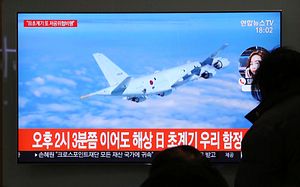The foreign ministers of Japan and South Korea have stressed the need for the two sides to stay in close communication after months of tensions over historical issues. But their face-to-face meeting in Davos got off to a rocky start because, hours earlier, Seoul accused a Japanese patrol plane of flying provocatively close to a South Korean warship.
Japanese Foreign Minister Taro Kono sat down with his South Korean counterpart Kang Kyung-wha on January 23, their first meeting since bilateral ties became strained over judicial rulings on wartime forced labor. The turbulence began on October 30 when South Korea’s Supreme Court upheld a lower court ruling requiring Nippon Steel & Sumitomo Metal Corporation to pay compensation to four citizens who were forced to work for a predecessor company during World War II. The Supreme Court subsequently upheld similar rulings involving other Japanese companies.
The Japanese government reacted furiously to those rulings, as previously outlined by The Diplomat. Tokyo has argued that such compensation orders violate international law, citing a 1965 bilateral agreement that indicated various claims were “settled completely and finally.” Japan is now seeking bilateral consultations on the issue. The South Korean government, to date, has emphasized the importance of respecting independent judicial rulings.
Then, just hours before Kono and Kang were due to meet, South Korea accused Japan of provocative behavior in international waters south of Jeju. South Korea’s defense ministry said that a P-3 patrol plane belonging to the Japan Maritime Self-Defense Force had flown close to the South Korean destroyer Daejoyeong.
According to a statement carried by Yonhap News Agency, the plane flew at an altitude of 60 to 70 meters some 540 meters from the ship. “This low-altitude, close-range flight toward the ship of a partner country again today is a clearly provocative act,” Suh Wook, chief director of operations at the Joint Chiefs of Staff, told a press conference, as Yonhap reported. Seoul asserted that it was the third such incident this month. The Japanese government argued the information was inaccurate and the aircraft had acted appropriately.
At the beginning of their ministerial meeting, Kang told Kono that the low-altitude incidents were “very annoying” and “regrettable,” Kyodo News reported. Kono, however, defended the Japanese planes’ actions and he cast the South Korean announcement as regrettable.
The meeting also touched on another defense-related dispute: Tokyo’s claim that a South Korean navy vessel locked its fire-control radar on a Japanese patrol aircraft in December. Kang suggested that the defense authorities should attempt to resolve the issue as soon as possible through consultations.
“The two ministers drew a common understanding that apart from the radar issue, the ROK-Japan and ROK-U.S.-Japan security cooperation, including on Korean Peninsula issues, should continue unswervingly,” said a summary issued by the foreign ministry in Seoul, using the acronym for the Republic of Korea, the official name of South Korea. Kono expressed hopes for “continued close communication and coordination” on prominent issues such as North Korea’s nuclear weapons.
On the matter of the forced labor rulings, Kono reportedly urged Kang to take tangible steps to resolve the dispute. He pressed her to accept Tokyo’s request for bilateral consultations.
Kang suggested that the foreign ministries of both countries “muster wisdom to prevent the issue from hampering efforts to advance the bilateral ties in a future-oriented way.” The South Korean government’s readout said the two ministers “reaffirmed the need for efforts to wisely address a number of thorny issues and thereby advance the bilateral relations.” They also agreed to maintain close communication and exchanges this year.
Despite the pledges to keep talking, a mutually acceptable resolution to the compensation dispute remains out of sight.
































